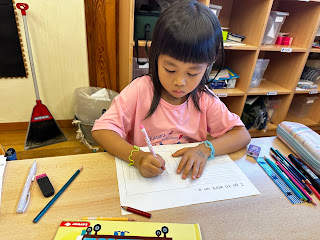For the Sorting Out stage in our Inquiry on the roles and responsibilities, the preschoolers wrote a riddle about their chosen community helper.
Through their research, they were able to gather information and knowledge about the different roles and responsibilities of people in the community.
]
The prompt 'What do you see?' was used to describe the different things, experiences, tools, people, and the environment they see in their jobs.
We all wear different hats.
Meaning, we take on many different roles and responsibilities in life. As early as preschoolers, students need to understand that these hats are important and help them create relationships with one another and with the people in their community.
So they created a hat and put it on their head to represent themselves as experts in their chosen community helper.
They wrote an informative book which will provide information about:
the roles and responsibilities
the tools used
the uniform or clothes
transportations,
and
the people they work together with
They are continuously searching for information that will them understand more about these people.
Their first experience as researchers paved the way for them to learn more about themselves as learners. They are encouraged to manage their time by starting, keep a steady pace and finish on time.
Yes, they have deadlines now that they have to meet!
and it is their responsibility to meet the deadline and produce work that they can be proud of.
The preschoolers will show their understanding to their parents during the Parent Teacher Conferences.









Comments
Post a Comment